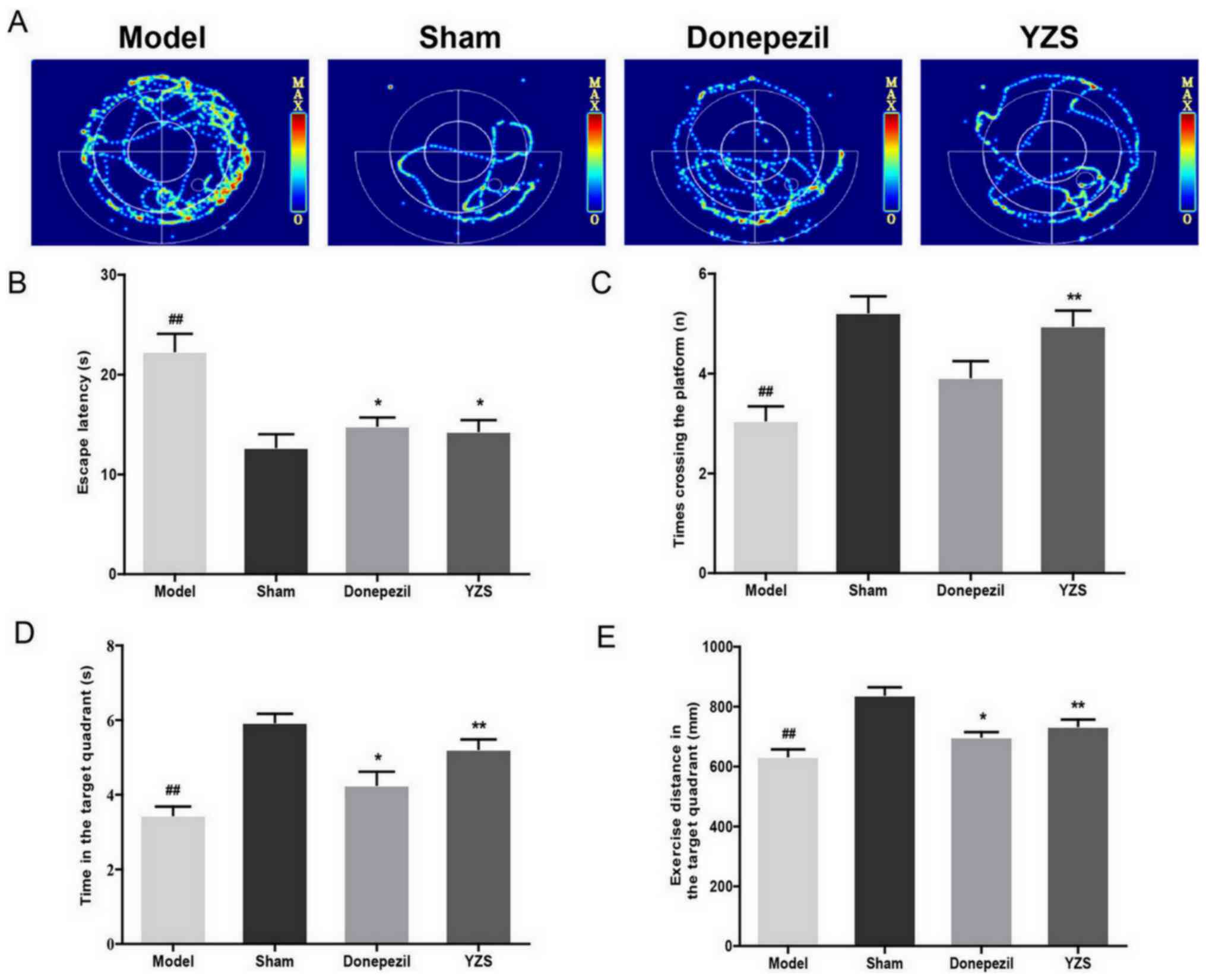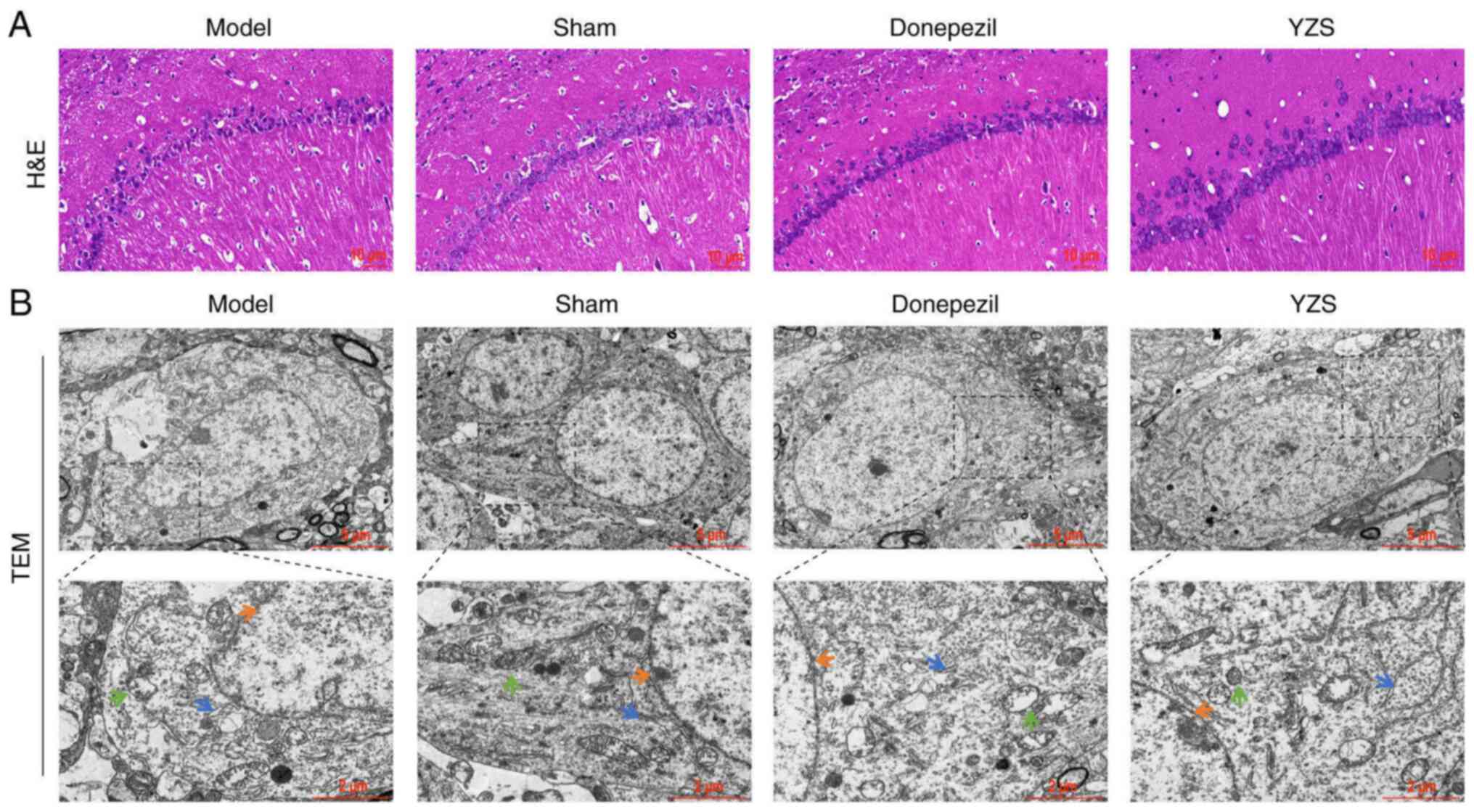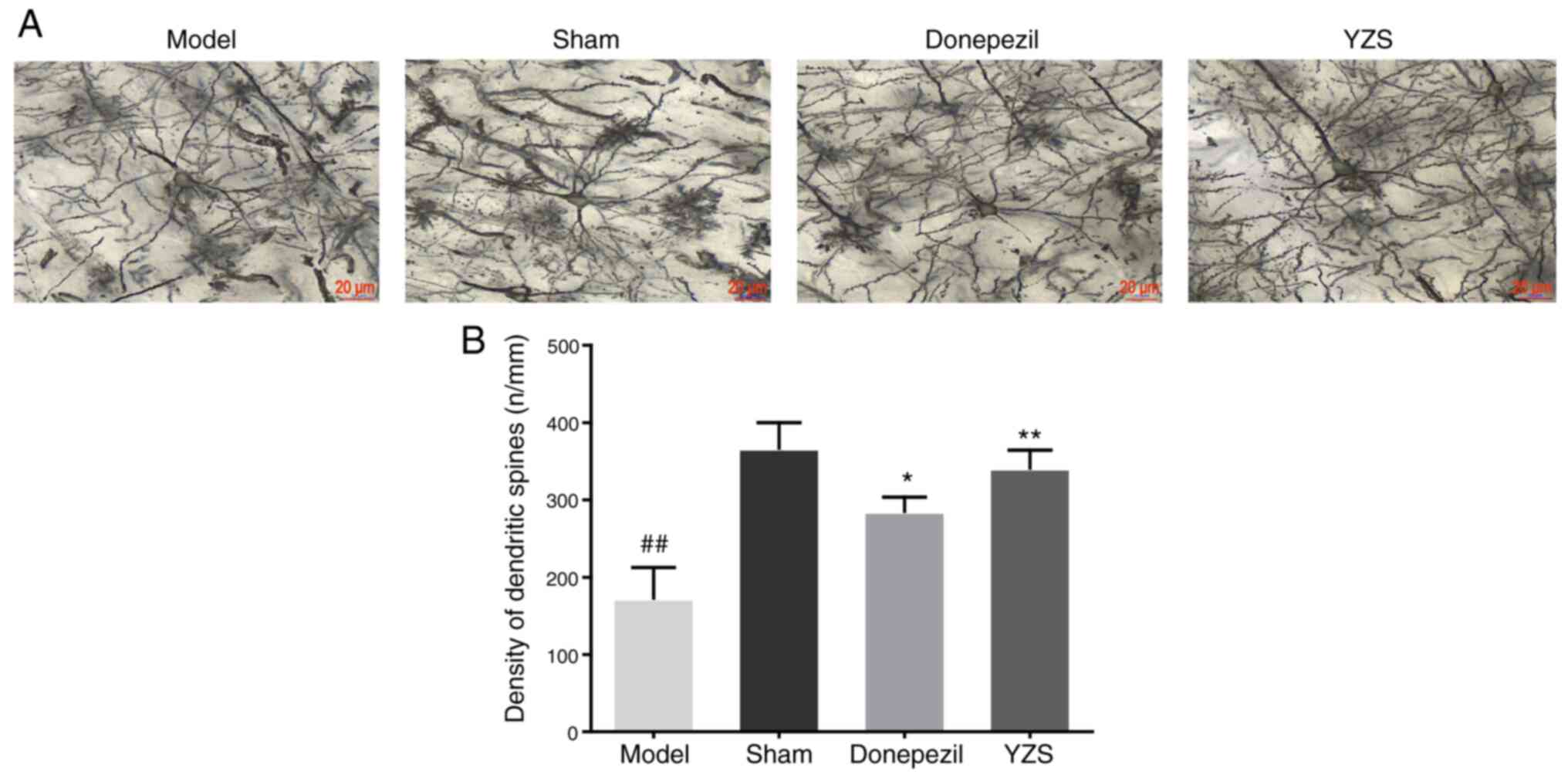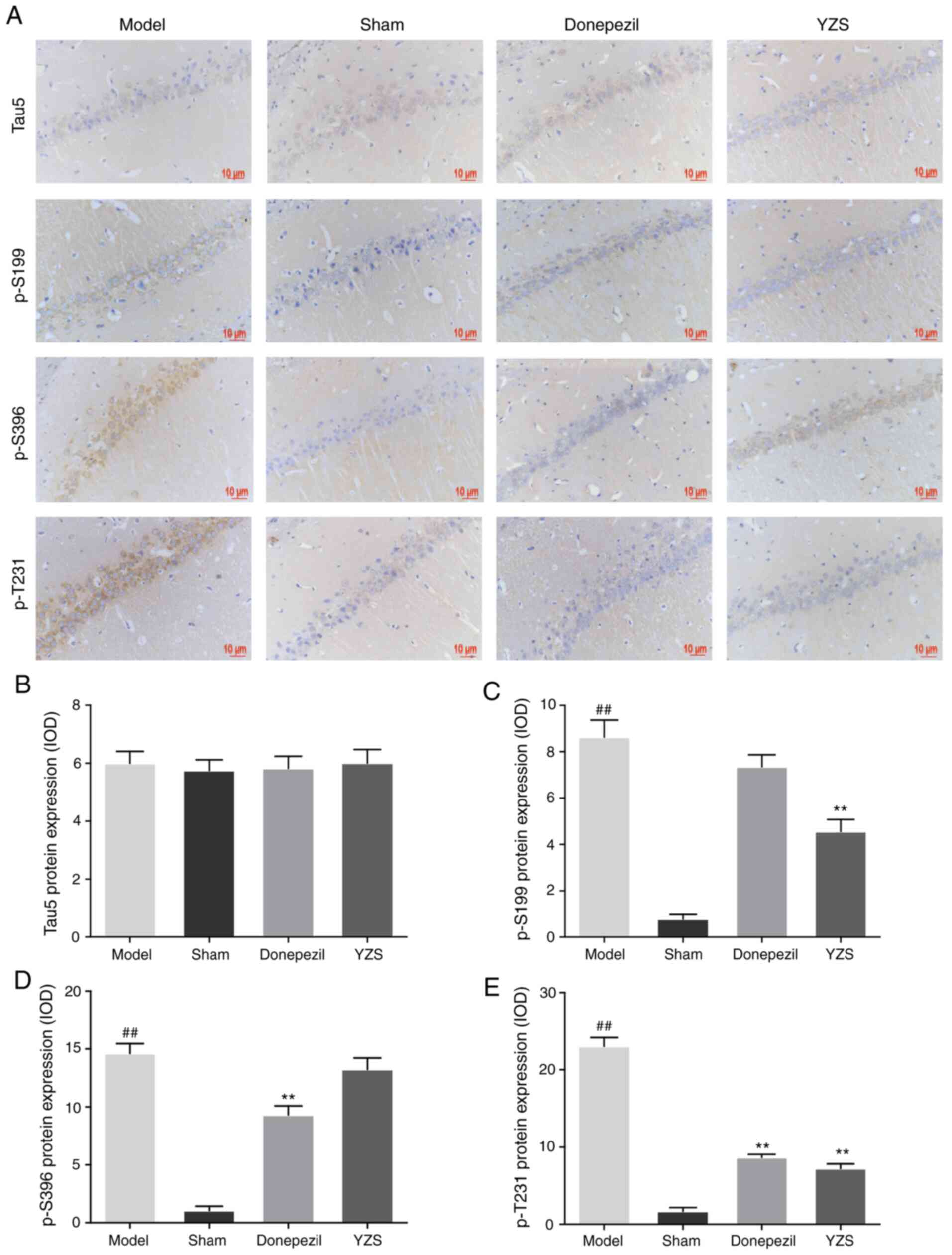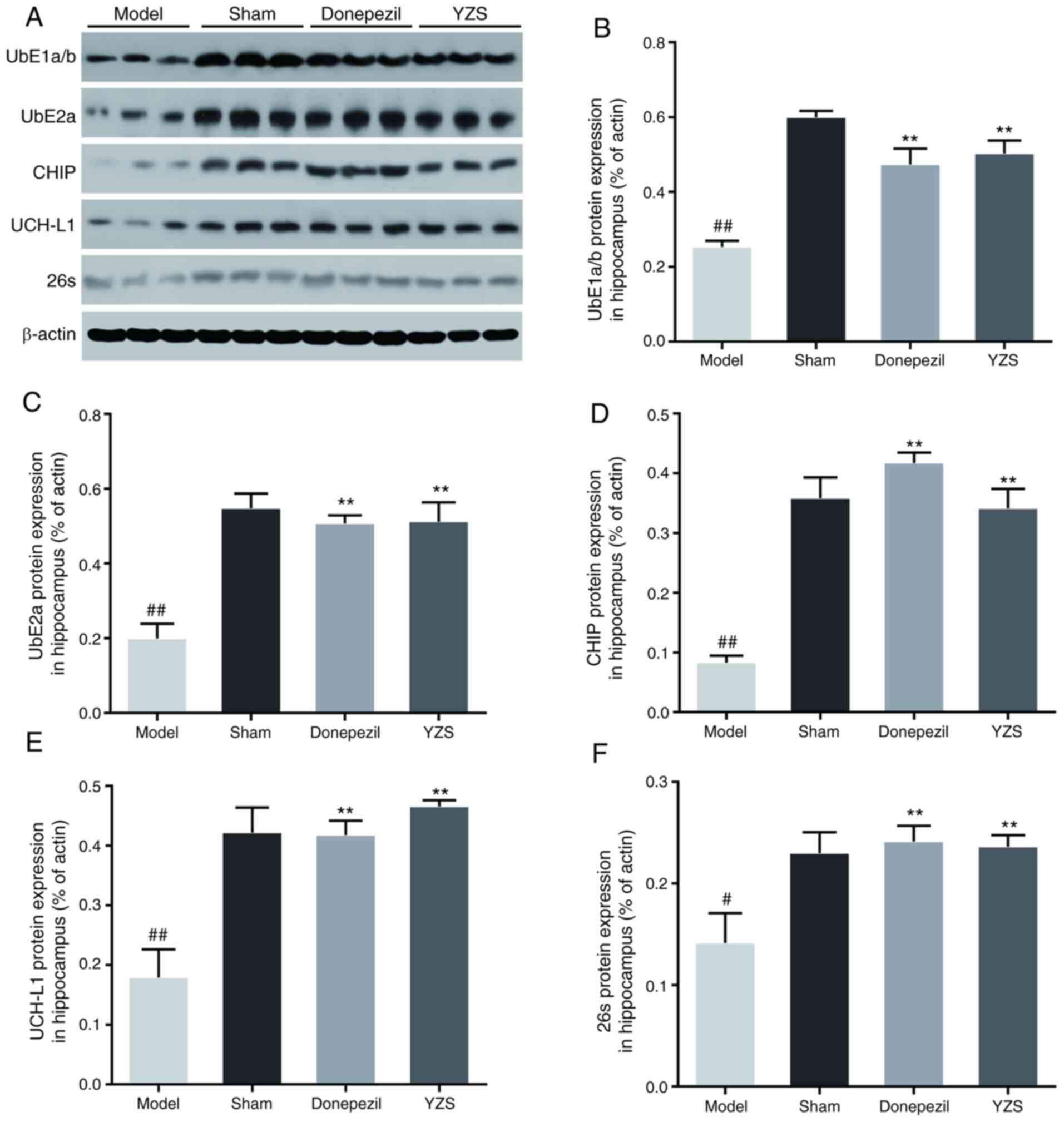|
1
|
Reitz C, Brayne C and Mayeux R:
Epidemiology of Alzheimer disease. Nat Rev Neurol. 7:137–152. 2011.
View Article : Google Scholar : PubMed/NCBI
|
|
2
|
Zhang HN, Wang MR, Chen XL, Xu YJ, Li J,
Wang HL and Du J: Research on the content construction of dementia
management in community based on Delphi method. Chin Gen Pract.
23:2072–2079. 2020.
|
|
3
|
Haake A, Nguyen K, Friedman L,
Chakkamparambil B and Grossberg GT: An update on the utility and
safety of cholinesterase inhibitors for the treatment of
Alzheimer's disease. Expert Opin Drug Saf Feb. 19:147–157. 2020.
View Article : Google Scholar
|
|
4
|
Titova NV: Memantine: From the original
brand to generics. Zh Nevrol Psikhiatr Im S S Korsakova.
117:136–143. 2017.(In Russian). View Article : Google Scholar : PubMed/NCBI
|
|
5
|
Patterson C: World Alzheimer report
2018-The state of the art of dementia research: New frontiers.
Alzheimer's Disease International (ADI). 1–48. 2018.
|
|
6
|
El-Hayek YH, Wiley RE, Khoury CP, Daya RP,
Ballard C, Evans AR, Karran M, Molinuevo JL, Norton M and Atri A:
Tip of the Iceberg: Assessing the global socioeconomic costs of
Alzheimer's disease and related dementias and strategic
implications for stakeholders. J Alzheimers Dis. 70:323–341. 2019.
View Article : Google Scholar : PubMed/NCBI
|
|
7
|
Jia J, Wei C, Chen S, Li F, Tang Y, Qin W,
Zhao L, Jin H, Xu H, Wang F, et al: The cost of Alzheimer's disease
in China and re-estimation of costs worldwide. Alzheimers Dement.
14:483–491. 2018. View Article : Google Scholar : PubMed/NCBI
|
|
8
|
Roberson ED and Mucke L: 100 years and
counting: Prospects for defeating Alzheimer's disease. Science.
314:781–784. 2006. View Article : Google Scholar : PubMed/NCBI
|
|
9
|
Zhang H and Zheng Y: β amyloid hypothesis
in Alzheimer's disease: Pathogenesis, prevention, and management.
Zhongguo Yi Xue Ke Xue Yuan Xue Bao. 41:702–708. 2019.(In Chinese).
PubMed/NCBI
|
|
10
|
Goedert M: Tau protein and the
neurofibrillary pathology of Alzheimer's disease. Trends Neurosci.
16:460–465. 1993. View Article : Google Scholar : PubMed/NCBI
|
|
11
|
Tramutola A, Di Domenico F, Barone E,
Perluigi M and Butterfield DA: It is all about (U)biquitin: Role of
altered ubiquitin-proteasome system and UCHL1 in Alzheimer disease.
Oxid Med Cell Longev. 2016:27560682016. View Article : Google Scholar : PubMed/NCBI
|
|
12
|
Al Mamun AA, Uddin MS, Kabir MT, Khanum S,
Sarwar MS, Mathew B, Rauf A, Ahmed M and Ashraf GM: Exploring the
promise of targeting ubiquitin-proteasome system to combat
Alzheimer's disease. Neurotox Res. 38:8–17. 2020. View Article : Google Scholar : PubMed/NCBI
|
|
13
|
Lee MJ, Lee JH and Rubinsztein DC: Tau
degradation: The ubiquitin-proteasome system versus the
autophagy-lysosome system. Prog Neurobiol. 105:49–59. 2013.
View Article : Google Scholar : PubMed/NCBI
|
|
14
|
Sulistio YA and Heese K: The
ubiquitin-proteasome system and molecular chaperone deregulation in
Alzheimer's disease. Mol Neurobiol. 53:905–931. 2016. View Article : Google Scholar : PubMed/NCBI
|
|
15
|
Liu G, He WB, Zhao ZQ, Chu SF and Chen NH:
Screening of core herbal combinations in anti-Alzheimer
prescriptions by using Traditional Chinese Medicine Inheritance
System. Chin J Exp Traditional Med Formulae. 22:223–228. 2016.
|
|
16
|
Zheng MY: Treatment of Alzheimer's
dementia in Taiyin people with shiqiupu Yuanzhi powder. J Med Pharm
Chin Minorities. 16:16–17. 2010.
|
|
17
|
Sun ZL, Wang MJ, Wang LJ, Wang F and Li B:
Theoretical discussion on treatment of senile dementia by
supplementing Qi, inducing resuscitation and clearing away heart
fire. J Basic Chin Med. 23:1374–1375+1401. 2017.
|
|
18
|
Guo J, Li B, Wang ZC, Wu YX, Yang Q and
Chen X: Effects of yuanzhi powder on learning and memory ability
and oxidative stress level of D-galactose induced aging mice. Chin
Arch Traditional Chin Med. 37:2144–2147+2314. 2019.
|
|
19
|
Jin YS, Li ML, Jin X, Zhao M, Lu HJ and Xu
QS: Efects of Shichangpuyuanzhisan on learning and memory abilities
in mice model with Alzeimer's disease. J Med Sci Yanbian Uni.
37:108–111. 2014.
|
|
20
|
Li B, Sun ZL, Chen GR, Zheng YQ, He XJ, Li
GM, Yang R, Zou SZ and Chen LW: Effects of Yuanzhi san on ethology
and cerebral acetylcholinesterase activity of memory disorder mouse
model induced by scopolamine. J Guangzhou Uni Traditional Chin Med.
34:733–736. 2017.
|
|
21
|
Qiang WJ, Chen Y, He FY, Xiao MF, Cai WY,
Dai YF, Yang Q, Li YJ, Weng XG, Li Q, et al: Molecular biological
mechanisms of Yuan Zhi powder in the treatment of Alzheimer's
disease: An analysis based on network pharmacology. Digital Chin
Med. 1:90–101. 2018. View Article : Google Scholar
|
|
22
|
Lin J, Gao S, Wang T, Shen Y, Yang W, Li Y
and Hu H: Ginsenoside Rb1 improves learning and memory ability
through its anti-inflammatory effect in Aβ1–40 induced
Alzheimer's disease of rats. Am J Transl Res. 11:2955–2968.
2019.PubMed/NCBI
|
|
23
|
Zhao J, Lu S, Yu H, Duan S and Zhao J:
Baicalin and ginsenoside Rb1 promote the proliferation and
differentiation of neural stem cells in Alzheimer's disease model
rats. Brain Res. 1678:187–194. 2018. View Article : Google Scholar : PubMed/NCBI
|
|
24
|
Hu HY, Cui ZH, Li HQ, Wang YR, Chen X, Li
JH, Xv DM and Zheng GQ: Fumanjian, a classic Chinese herbal
formula, can ameliorate the impairment of spatial learning and
memory through apoptotic signaling pathway in the hippocampus of
rats with Aβ 1–40-induced Alzheimer's disease. Evid Based
Complement Alternat Med. 2014:9429172014. View Article : Google Scholar : PubMed/NCBI
|
|
25
|
Paxinos G and Watson C: The rat brain in
stereotaxic coordinates. 6th edition. Amsterdam Boston Academic
Press/Elsevier; 2007
|
|
26
|
Gentier RJ and van Leeuwen FW: Misframed
ubiquitin and impaired protein quality control: An early event in
Alzheimer's disease. Front Mol Neurosci. 8:472015. View Article : Google Scholar : PubMed/NCBI
|
|
27
|
Gao Y and Tan L, Yu JT and Tan L: Tau in
Alzheimer's disease: Mechanisms and therapeutic strategies. Curr
Alzheimer Res. 15:283–300. 2018. View Article : Google Scholar : PubMed/NCBI
|
|
28
|
Lacosta AM, Insua D, Badi H, Pesini P and
Sarasa M: Neurofibrillary tangles of Aβx-40 in Alzheimer's disease
brains. J Alzheimers Dis. 58:661–667. 2017. View Article : Google Scholar : PubMed/NCBI
|
|
29
|
Zhang JY, Liu SJ, Li HL and Wang JZ:
Microtubule-associated protein tau is a substrate of
ATP/Mg(2+)-dependent proteasome protease system. J Neural Transm
(Vienna). 112:547–555. 2005. View Article : Google Scholar : PubMed/NCBI
|
|
30
|
Keck S, Nitsch R, Grune T and Ullrich O:
Proteasome inhibition by paired helical filament-tau in brains of
patients with Alzheimer's disease. J Neurochem. 85:115–122. 2003.
View Article : Google Scholar : PubMed/NCBI
|
|
31
|
Keller JN, Hanni KB and Markesbery WR:
Impaired proteasome function in Alzheimer's disease. J Neurochem.
75:436–439. 2000. View Article : Google Scholar : PubMed/NCBI
|
|
32
|
Nijman SM, Luna-Vargas MP, Velds A,
Brummelkamp TR, Dirac AM, Sixma TK and Bernards R: A genomic and
functional inventory of deubiquitinating enzymes. Cell.
123:773–786. 2005. View Article : Google Scholar : PubMed/NCBI
|
|
33
|
Xie M, Han Y, Yu QT, Wang X, Wang SH and
Liao XM: UCH-L1 inhibition decreases the microtubule-binding
function of tau protein. J Alzheimers Dis. 49:353–363. 2016.
View Article : Google Scholar : PubMed/NCBI
|















